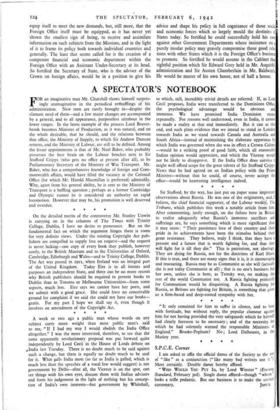A week or two ago a puhlic man whose words
on any subject carry more weight than most public men's said to me, " If I had my way I would abolish the India Office altogether." I was the more interested, therefore, to see that the same apparently revolutionary proposal was put forward quite independently by Lord Cecil in the House of Lords debate on India last Tuesday. There is no doubt much to be said against such a change, but there is equally no doubt much to be said for it. What galls India most (so far as India is galled, which is much less than the speeches of a vocal few would suggest) is not government by Delhi—after all, the Viceroy is on the spot, can see things with his own eyes, discuss them with Indian advisers and form his judgement in the light of nothing but his concep- tion of India's own interests—but government by Whitehall,
to which, still, incredibly trivial details are referred.' If, as Lord Cecil proposes, India were transferred to the Dominions Office, the psychological advantage would be obvious and immense. We have promised India Dominion status repeatedly. For reasons well understood, even in India, it cannot be made a reality at that end immediately. But it can at this end, and such plain evidence that we intend to stand in London towards India as we stand towards Canada and Australia and South Africa—instead of maintaining the elaborate apparatus by which India was governed when she was in effect a Crown Colony —would be a striking proof of good faith, which all reasonable Indian opinion would appreciate, and which the Viceroy would not be likely to disapprove. If the India Office does survive it might well afford scope for the great talents of Sir Stafford Cripps. News that he had agreed on an Indian policy with the Prime Minister—without that he could, of course, never accept the office—would be heartening intelligence indeed.
* * * *


























 Previous page
Previous page